




















ever several attempts to build citizens of the state failed for decades? The evidence is so glaring as we keep recording huge housing population census conducted since independence. The Ghana Population and Housing Census of about 1.8million. The ripple dramatic increase in slum communities, unapproved settlements, and substandard residential structures across major cities in Ghana particularly Accra. The state tried to change the trajectory, so did the private sector but all to no avail.
The Bank of Ghana has reiterated that it stands ready to provide emergency liquidity support for banks in the country in line with their rules for liquidity assistance.

According to the Central Bank, though no bank in the country has applied for liquidity support from the central bank currently, it has put in place measures to ensure the banking sector remains solvent and strong to support economic growth, despite the recent challenges faced by the country.
The good news however bad the situation may be today is that, 66 Engineering Ltd has reinvented the science, art and engineering of building standard residential houses that cost less than Ghs 60,000 in the capital city Accra, and even much more less in the other regions across the country. 2 | P a g e
Governor of the Bank of Ghana (BoG) Dr. Ernest Addison said, “We have not had any bank ask
standard yet building cheaper residential homes that every of one’s income level or class of society. The project in picture in this publication is one of our projects in Accra that has become the cynosure of all eyes for the past few weeks we erected this structure. This is one of our interlocking brick’s cheaper building solutions. The bricks by designed have two (2) round holes and a small rectangular perforation in the middle. These holes are purposely for mortar joints and in some cases serves as conduits for plumbing pipes, electrical cable pipes, bamboo or iron reinforcement. Remember the technology is not bricks that have been in the system that we all know. This technology is in the family of the stabilized compressed earth. It is a ratio of cement, clay or laterite, in some cases giving us a brick with average compressive strength of 8Mpa far higher than the average industry compressive strength
plastering building, paint ing, (you can only polish it if onlyent color designs). Color of the house can be kept consciously by a selective choice of the clay or laterite or a mixture of the two, the building maintains an environmentally friendly temperature that there will be no need to spend a dime on air conditioner installation and the electricity to power them. Alternatively, one can garnish this structure with natural stone décor marbles to give it that luxurious taste. The interior can be plastered depending on the taste and preference of the individual, or better still be sealed and polished with a special varnish cheaper than plastering and painting. Ceiling and lamp holders can be processed bamboo which is a local content input and environmentally friendly
for liquidity assistance partly because of the regulatory reliefs that we gave them. We reduced the reserve requirement as part of the Domestic Debt Exchange Programme (DDEP) but I always make the point that should any bank need liquidity, the Bank of Ghana would stand ready to provide the resources in line with our rules for liquidity assistance.” This comes as banks in the country recorded after-taxes losses amounting to GH 6.6 billion in 2022.
Bank, International Finance Corporation (IFC) through the EDGE initiative, the ECOWAS community, African Union, the African Continental Free Trade Area Secretariate for partnerships, inves that 66 Engineering can do mass production of these GREEN BUILD ING TECHNOLOGY housing in gated estate communities to put shelter over the heads of the homeless majority of African people in our homeland Africa. You can reach us on: www.66engineering.com or send us a mail via 66engineeringgh@g mail.com for further information. Remember that the future is always built today and not tomor row. Imagination is our hallmark at 66 Engineering. Do not sit on the fence, join the revolution now!. 66 Engineering: Bringing Imag ination to Reality!
Exchange Programme (DDEP). 23 banks operating in the country participated in the exercise. Most banks reported signi cant losses on the back of the mark-to-market valuation losses on their respective holdings in Government of Ghana bonds following the implementation of the DDEP. Other losses were due to higher impairments on loans and rising operating costs.
Writer: DANIEL KONTIE
Position: Managing Director (66 Engineering Ltd)
Contact: +233209032280



This was largely due to negative impact of the Domestic Debt
bamboo tiles et cetera ect cetera. The reality is that, you end up having a complete house with sound and superiorstructural integrity,
The industry posted before-tax losses of GH¢8.0 billion in 2022 compared with a pro t of GH¢7.4 billion recorded in 2021.
To increase access to a ordable, quality healthcare in Ghana, IFC today announced a partnership with Accra Medical Centre Ltd. (AMC) to help the health service provider expand its operations in Accra and in Takoradi in the Western Region of Ghana, where modern facilities are more limited.

Under the partnership, IFC will provide a $5.7 million loan to AMC, supporting the construction of a new 20-bed hospital in Takoradi, reducing the need for some patients to travel for quality care.
In Accra, AMC plans to upgrade its maternity services, intensive care units, and specialist surgeries at its
existing hospital that expects to increase the number of patients it serves annually to 120,000. In addition to providing nancing, IFC will advise AMC on healthcare quality management and on advancing its strategy to service lower income patients.
“In eleven years, AMC has grown rapidly from a primary care clinic and o site mine hospital operator to a fully equipped modern hospital currently serving 90,000 patients per annum,” said Dr. Cynthia Opoku-Akoto, AMC’s Chief Executive O cer and founding doctor. “IFC’s package of nancing and advisory services is the

type of support we need to allow us to raise the quality of our care even higher while building a sustainable business for the long term,” she added.
“The private sector plays an increasingly critical role in delivering quality healthcare in Ghana,” said Kyle Kelhofer, IFC’s Senior Country Manager for Benin, Ghana, Guinea, and Togo. “IFC’s partnership with Accra Medical Centre will increase access to quality healthcare in Ghana, supporting the country’s goal of expanding access to quality health coverage.”
Since the outbreak of the COVID-19 pandemic in 2020, IFC has provid-
ed more than $16 million in nancing for healthcare providers in Ghana, including to Nyaho Medical Centre, New Crystal Health Services, and Quest Medical Imaging. The AMC partnership will be IFC’s single biggest investment in a health service provider in Ghana.
IFC’s investment is supported by the International Development Association’s Private Sector Window Local Currency Facility (IDA PSW LCF), which protects against currency uctuations. IDA PSW support is also necessary to enable IFC to provide AMC with a ordable, long-term funding in local currency.
Andrew Takyi-Appiah, the Managing Director (MD) of Zeepay, a leading mobile nancial services company, has emerged Africa's Fintech Leader of the Year for the second year in a row at the recently held 2023 edition of the CEO Summit.

The prestigious award was presented to him before a gathering of more than 500 of his peers, was an acknowledgement of his instrumental role in the growth and advancement of Sub-Saharan Africa's economic landscape.
Mr. Takyi-Appiah emerged victorious amidst sti competition from prominent gures
in the ntech industry, and the award re ects the high satisfaction of users with Zeepay's platforms and services. Expressing his gratitude at the event which had as its theme: ‘Economic Sovereignty, Sustainable Corporate Governance, Digital Industrial Transformation: New Paths for Growth and Prosperity. A Private-Public Sector CEO Dialogue & Learning’, Mr. Takyi-Appiah stated, "Winning this award is a testament to all that African youth are Capable of and have what it takes to build global business. It means that we the youth in Ghana must be taken seriously as we have indeed taken our destiny into our hands to
contrib -
ute to build a better Ghana.”
Prior to co-founding Zeepay in 2016, Mr. Takyi-Appiah held key positions at renowned organizations such as UT Bank Ghana, PwC Ghana, PwC UK, Ecobank Transnational Incorporated, and GTBank.
With an annual turnover of approximately US$900 million as of 2021, Zeepay has established itself as the largest cross-border remittance aggregator in Africa. Mr. Takyi-Appiah emphasized that this accolade is a testament to the strength of Ghana's ntech regulations and legal systems, which have contributed to the rise of companies like Zeepay.
“Our customers should expect an improved business, an increase in our distribution network and availability. Going forward our customers should expect a ordability in terms of reduced cash-out fees and more product innovation. I would like to dedicate the award to all our customers and sta for believing in the dream and driving it to this growth. I feel great and excited about the additional new markets
we have added to the mobile money business,” Mr. Takyi-Appiah added.
This comes as Zeepay also emerged as the number-one company in Ghana at the 19th Club 100 awards. The recognition underscores Zeepay's exceptional performance and its signi cant contribution to the nation's economic growth.
The feat was attributed to the ingenuity of CEO Andrew
Takyi-Appiah and as Zeepay's vision is to expand its presence in the ntech and mobile money space beyond Ghana.
With its innovative mobile nancial services, Zeepay has been revolutionizing the remittance and mobile money sectors. The company's impressive growth and strategic approach have propelled it to the forefront of Ghana's business landscape. By clinching the top position in the Ghana Club 100
rankings, Zeepay has solidi ed its status as a key player in the country's corporate sphere.
As Zeepay looks toward the future, it aims to leverage its success to further establish itself as a dominant force in ntech and mobile money across Africa. With CEO Andrew Takyi-Appiah at the helm, the company is poised to unlock new opportunities and drive nancial inclusion on the continent.
up shop not too far from the then International Commercial Bank (ICB) and as providence would have it, my friend’s friend decided to open an account with ICB. This was purely because of proximity, I was told.
The relationship was quite normal and Sag-An over the years recorded steady growth as ICB’s focus was Small and Medium Enterprises (SMEs). The relationship took a more positive turn with the emergence of FBNBank on the scene in 2013, as the Bank bought the ICB franchise across West Africa.
According to Margaret Sylvia Asamoah, CEO of Sag-An, “we could immediately tell there was a di erence in the way our issues were handled and how we were treated. All our anxiety about how the new owners of the Bank would continue the business were dispelled. These guys were committed to win us over at all costs and I must say they have succeeded. Our progress can be credited to them, particularly the support they have given to us over the years, and we would gladly recommend them to any businessperson who needs a reliable and understanding bank to work with.”
FBNBank has been and continues to be Sag-An’s major bank handling all their key transactions.
The story of Sag-An brings to the fore how a Bank can empower an SME and thereby help transform the economy. FBNBank remains committed to deliver the ultimate gold standard of value and excellence to customers and clients as a way of becoming a partner of choice in building their future.
Victor Yaw Asante, Managing Director and Chief Executive O cer of FBNBank tells me that, “all institutions need to build trust and one of the most common ways is to deliver on what you promise as a brand. At FBNBank we promise to keep our clients at the heart of what we do. For us this is the only way we can ensure a win-win situation which will keep both client and Bank satised. This has been tested over the years, even by our parent bank, First Bank of Nigeria in their 129 years of existence and it has delivered for them.”

Undertaking business with an agenda to go the extra mile for your patrons can be counter-productive at times but truth be told, it is in wowing your clients with your service and products that they will be hooked onto you. This seems to be exactly what FBNBank has done over the years.
FBNBank’s Brand DNA is “You First,” a claim which obviously has serious altruistic leanings and would raise issues of doubt in the minds of some of us regarding how successful such an agenda of being
very focused on making your clients satis ed would be. What about pro t? Isn’t that why we go into business? Well, if this is so in your case, as it was for me years ago, do not be because there is ample proof that this Bank backs this claim to the hilt with action and is making a success of it.
In 2007 a friend of a friend registered a business, Sag-An Limited for the supply of building materials, civil and electrical construction, water, and sanitation services. They (Sag-An Limited) set
Today, Sag-An is one of the top hardware building materials suppliers with a total of four outlets in the Central Region. This achievement was made possible in part because of the tenacity of Margaret Sylvia Asamoah and FBNBank that was willing to work and grow with the Client. Fact is, FBNBank has been there for Sag-An ensuring that all the necessary support the Client needed was available to them. This helped Sag-An to build the needed capacity for expansion and growth. Along with this came with an increase in the Client’s sta size from an initial ve to 58 employees that work with Sag-An.
For 16 years, FBNBank nurtured Sag-An, putting the interest of the client rst in keeping with our DNA. While it may seem a great story of how to remain focused on one’s brand positioning, the critical issue here for me is the fact that yet again we get to see how true the saying that the “customer is king” is. Sometimes we confuse the point about this, but I tell you that in ensuring that the customer remains king, you will be generating the needed momentum which your business requires for a solid performance. As Mr. Asante said, “it is a win-win situation” but I say, if anyone had told me banking can be o ered on an altruistic platform I would have shouted “no”. Now I know better courtesy of FBNBank which preaches putting customers at the heart of what it does and backs it with putting them rst. You may want to get a taste of the FBNBank experience. I say, “try it.”
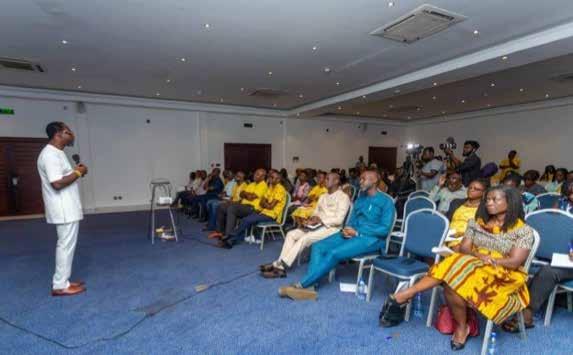
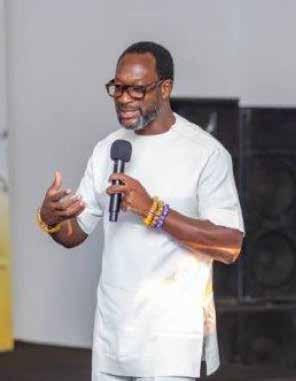
telecommunications and digital services available to all its customers.
by 2040.and developing relationships with their audience, PR profes sionals employ social psychology which focuses on “how people’s thoughts, feelings, beliefs, inten tions, and goals are constructed within a social context by actual or imagined interactions with others”. This eld of psychology helps practitioners understand their audience and tailor informa tion/messages accordingly.
Before drawing up any communi cation strategy for a brand and or product, PR professionals conduct extensive research into the brand and its audience. The ndings guide the direction of the messages and strategies. Some of these factors included the follow ing points.
1. The goal of the communica tion: This is a speci c and mea surable objective that the organi zation seeks to achieve through communication activities. The desired outcome that the commu nicator aims to accomplish through their communication e orts.
and what you are doing about it.
why TikTok is very popular among young people. The app focuses on the people factor and how to appeal to them. The features of the app invites people to willingly participate and share, allowing them to feel involved, showo their skills and feel special.
The joint session was held in Takoradi under the theme ‘Leveraging Technology to serve Customers with Excellence’. Mr. Adadevoh stated that MTN’s strategy is anchored in the belief of building the largest and most valuable platform business with a clear focus on Africa.
ensures that your messages are remembered.
All these points seek to prove that a good PR plan is guided by theories and application of psychology. People are in uenced by a number of di erent factors before they take action on something. Depth of information and objective facts plays a role here, however, it is often outweighed by emotional or psychological factors.
He shared details on what MTN Ghana is doing to achieve its strategic objectives. Some of these initiatives involves putting control in the hands of customers. Selorm stated that MTN has invested over One million dollars in a Call Center technology transformation that will enable MTN to serve customers better.
He stated that MTN strives to promote nancial inclusion, collaborate with partners to create value for stakeholders, and foster inclusive economic growth in Africa. The presentation also highlighted the speci c ways in which MTN contributes to national development through Corporate Social Initiatives, as well as its contributions in terms of taxes and levies to support Ghana's socio-economic progress.
2. Identify and understand the target audience: This includes mapping out the intended receiv-

The Chief Executive O cer (CEO) of MTN Ghana, Selorm Adadevoh, has engaged key stakeholders in the Western and Central regions of
I believe this is one of the reasons
Ghana, sharing with them updates on MTN’s strategy, operational activities, and initiatives the company is undertaking to make
3. Communicate the value of the message: In communication, it is very important to think about the value of your message from the perspective of your target audience such that you are able to position the message in a manner that resonates with their own interest and is easily accepted. For example, assuming I want to secure a partnership with a software company and a bank, my approach to each company will be targeted to what each company does and how they seek to bene t from the partnership. This means that I will be communicating the uniqueness of the partnership to each company. Each situation is di erent, so it's helpful to be able to apply di erent approaches and techniques to deal with every given scenario. Ultimately, the key to creating a hook is to be creative, strategic, and audience-focused which
He said additionally that the company had optimized its Interactive Voice Response (IVR) and introduced additional Self-Service Platforms and Digital Channels such as Ayoba and MyMTNapp2.0 to enhance customers’ experience on the network.
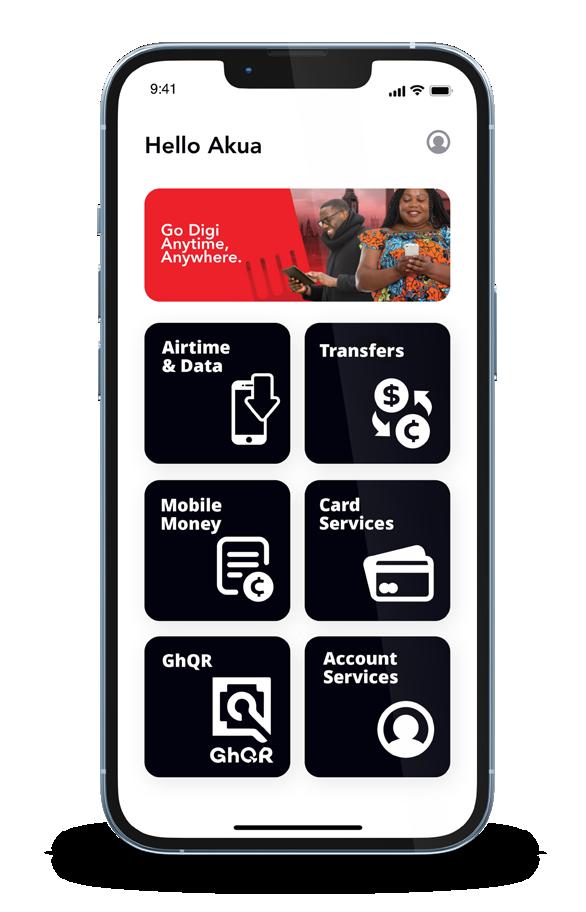
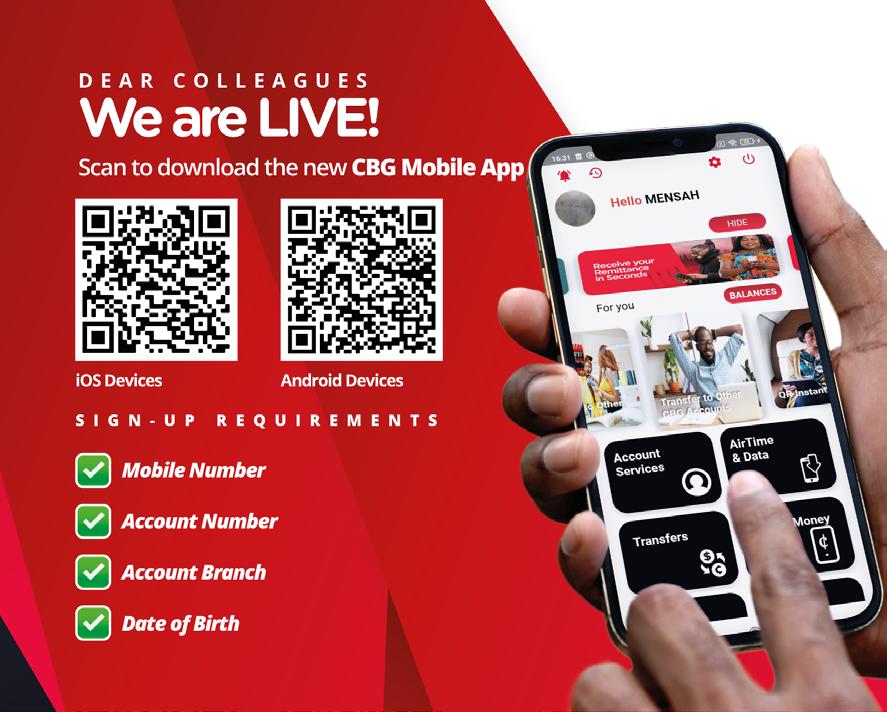
Mr. Adadevoh provided further information on MTN’s Environmental, Social, and Governance (ESG) initiatives. He emphasized that MTN was dedicated to safeguarding the environment by aiming for zero carbon emissions
In conclusion, the relationship between Public Relations and Psychology cannot be denied as they are intricately intertwined. Public Relations professionals have come to realize the importance of psychology in their eld as it enables them to understand their audience, craft e ective messages, and achieve their desired outcome. It is important to note that PR professionals do not use manipulation, but rather apply psychological theories to build mutually bene cial relationships with their audience. Therefore, the use of psychology in Public Relations is a vital aspect that should be embraced and utilized to create impactful and e ective communication strategies.
The MTN Media and stakeholder forum was attended by representatives from the print, radio, and online industry as well as other key stakeholders from the regional o ces of the National Communications Authority (NCA), Environmental Protection Agency (EPA), and MTN’s trade partners in the Central and Western regions.
Prior to the forum, MTN o cials organized a capacity building session to educate the media on how telecoms systems operate to deliver service to customers. Selorm Adadevoh also led a delegation to pay a courtesy call on the Western Regional Minister, Mr. Kwabena Okyere Darko as part of the regional engagement.


the Africa Workplace Leadership Summit, said, “Recent data by Gallup show that about 79% of the millions that work in organizations in Africa are not contributing meaningfully to the growth of their organizations. This is estimated to be costing organizations in Africa - public and private - over $200 billion." "Which means that business leaders are getting much less results than they could generate in their workplaces,” he added.
According to Godswill, “The time has come to revolutionize workplaces in Africa organizations such that innovation is increased, productivity improved and optimal performance experienced."
All is now set for the Africa Workplace Leadership Summit set to hold on 16th June, 2023 virtually, being put together by Fox Leadership Institute.
This "exceptional and epoch-making summit" as described by the convener, will see Africa business leaders and leaders of public institutions and government agencies gather at this Summit to network, collaborate across value chains and have conversations about leader-
ship issues hindering productivity in their workplaces.
Attending this summit will be entrepreneurs and founders, executives and business leaders, thought leaders and experts, who will gather to discuss issues hindering productivity in the workplace and pro er solutions that are workable in the African context.
Godswill O. Erondu, convener of
Through keynote presentations, panel discussions, and award winning interviews the summit will feature discussions bordering on critical issues about leadership in the workplace, with the goal being to engender action toward the creation of a workplace that's safe, secure and conducive for great work that impacts positively on the bottomline – a workplace where workers are inspired to unleash their potential and ourish.
In a statement made available to us, the organizers said that, at the end of the summit a white paper will be released that business leaders can implement in their workplaces, adding that, they will produce Africa Workplace Magazine which will contain the presentations, panel discussions during the summit and more.
A partial line up of expected keynote speakers and panelists include: Prof. Ndubuisi Ekekwe, Founder, Tekedia Institute and Chairman, Tekedia Capital (US); Dr Brian Reuben, Founder and CEO, Africa Economic Summit Group (UK); Akeem Lawal, Divisional CEO, Interswitch Group (Nigeria); Funke Amobi, Deputy Head of Operations, StanbicIBTC Bank PLC; Dr Dominic Oduro-Antwi, President, Global Africa Trade Advisory Chamber (Ghana); Emmanuel Michael, Head of People And Culture, Letshego MFB (Nigeria); Adedoyin Adebayo, Organizational Development Expert And Lead Consultant, Insel Consulting Group (Nigeria); Dr Chris Egbu, DG, Centre for Public Service Productivity and Development, Lagos; Ke lwe Morobane, Founder and MD, Giving Wings, (South Africa), Frida Owinga, Founder, PassionPro t, (Kenya); Inuaghata Nosakhare, MITD, CISM, Lead Trainer, Lead Essence Training & Development; Wilson Samson, Lead Strategist, Lystrab Ltd; and many more.
In nancial markets, prices of assets go up and down. In some cases, these market uctuations bring with them unwelcomed disruptions to business operations.
Recently the South African rand found itself in a situation where it depreciated against the US dollar over concerns about planned electricity blackouts a ecting the economy and a diplomatic misunderstanding between South Africa and United States regarding unproven claims that South Africa supplied arms to Russia.
The rand has since clawed back some lost ground against the greenback after South Africa dismissed the weapon sales claims and said it will establish a commis-
sion of inquiry to investigate the matter and promised to take appropriate steps if the country’s arms control laws were violated.
South Africa has an open economy and the stability of the rand, one of the world’s most traded currencies, is crucial to its long-term prosperity and economic development. While at rst glance a weaker currency may come across as a worrying development that may trigger in ation due to prices of imports becoming more expensive, it can also have a stimulus e ect on the domestic economy.
In the context of South Africa, tourism and exports will receive a massive boost from a depreciated rand, making the country more
attractive as a destination for tourists while exports will become cheaper compared to goods priced in stronger currencies. Even before the rand softened against the US dollar, South Africa was an a ordable destination and the current round of rand’s depreciation will put more cash in the pockets of tourists, who can use the extra money to enjoy shopping, entertainment, and visiting some of the most exotic and beautiful places the country has to o er.
South Africa, like any other country that engages in foreign trade, aspires to have a stable, competitive currency, which helps exporters to be competitive in international markets.
disrupt their operations and cause nancial losses.

In the meantime, South African exporters must take advantage of the current window opportunity presented by the weak rand to increase export sales to global markets while protecting themselves from unpredictable uctuations in the value of the rand.
of new investment capital into the country. In the past ve years, South Africa has received investments to the tune of R1.5 trillion, showcasing its status as an attractive investment destination. These investments are expected to drive industrial growth and generate employment.

gross domestic product (GDP) of $3.4 trillion. By 2050, the continent is expected to be home to 2.5 billion people and combined GDP is projected to grow to $7 trillion by the year 2035.
ever materialized in Ghana where several attempts to build citizens of the state failed for decades? The evidence is so glaring as we keep recording huge housing population census conducted since independence. The Ghana Population and Housing Census of about 1.8million. The ripple dramatic increase in slum communities, unapproved settlements, and substandard residential structures across major cities in Ghana particularly Accra. The state tried to change the trajectory, so did the private sector but all to no avail.
While currency devaluations and depreciations are a fact of life that drive up in ation and expose consumers and companies to high interest rates, low investor con dence, and economic slowdown.
At 66 Engineering, we provide our clients with several alternatives and opportunities of building standard yet building cheaper residential homes that every of one’s income level or class of society. The project in picture in this publication is one of our projects in Accra that has become the cynosure of all eyes for the past few weeks we erected this structure. This is one of our interlocking brick’s cheaper building solutions.
One of South Africa’s competitive advantages, which makes it attractive to multinationals looking to set up operations in Africa, is that it has world-class logistics infrastructure and a sophisticated nancial system.
Many large nancial institutions operating in the country o er foreign exchange derivatives to hedge exporters, importers, and investors against the rand’s volatility.
The bricks by designed have two (2) round holes and a small rectangular perforation in the middle. These holes are purposely for mortar joints and in some cases serves as conduits for plumbing pipes, electrical cable pipes, bamboo or iron reinforcement.
requirements of a concrete block. The structure does not require plastering after building, no painting, (you can only polish it if onlyent color designs). Color of the house can be kept consciously by a selective choice of the clay or laterite or a mixture of the two, the building maintains an environmentally friendly temperature that there will be no need to spend a dime on air conditioner installation and the electricity to power them. Alternatively, one can garnish this structure with natural stone décor marbles to give it that luxurious taste.
The government is also allocating funding to strengthen law enforcement to combat money laundering and terrorism nancing. As such, an allocation of more than R200 million has been made to the Financial Intelligence Centre (FIC), South Africa’s anti-money laundering unit, to implement recommendations made by the Financial Action Task Force (FATF) when it greylisted the country in February this year. The funding for FIC forms part of the country’s response to get itself o the greylisting.
The reforms being undertaken are a strong signal that South Africa is determined to maintain an enabling environment for multinationals looking to spread their tentacles across Africa.
The good news however bad the situation may be today is that, 66 Engineering Ltd has reinvented the science, art and engineering of building standard residential houses that cost less than Ghs 60,000 in the capital city Accra, and even much more less in the other regions across the country.
These derivatives are a useful hedge for managing currency risks, enabling businesses to protect themselves from wild market swings that could potentially
Remember the technology is not bricks that have been in the system that we all know. This technology is in the family of the stabilized compressed earth. It is a ratio of cement, clay or laterite, in some cases giving us a brick with average compressive strength of 8Mpa far higher than the average industry compressive strength
South Africa has had a fair share of challenges, ranging from electricity supply constraints to logistics and transport bottlenecks. However, these infrastructure backlogs are being addressed through structural reforms aimed at improving South Africa’s economic competitiveness and reducing the cost of doing business by upgrading energy, rail, roads, ports, water, and telecommunications infrastructure. The structural reforms, including boosting energy generation, are necessary to steer the economy on a high-growth trajectory.
The interior can be plastered depending on the taste and preference of the individual, or better still be sealed and polished with a special varnish cheaper than plastering and painting. Ceiling and lamp holders can be processed bamboo which is a local content input and environmentally friendly
So far, the reforms are bearing fruit as evidenced by the in ow
bamboo tiles et cetera ect cetera. The reality is that, you end up having a complete house with sound and superiorstructural integrity,
South Africa is a member of the African Continental Free Trade Area (AfCFTA), the world’s largest free trade area, which covers 47 countries that have a combined population of 1.3 billion people and
eco-friendly, and 50 times cheaper compared to the conventional concrete house. Now is the time for us as Ghanaians and Africans at large to embrace these innovations reinvented by 66 Engineering to build that enviable motherland of African states for ourselves and posterity. By this publication, we are therefore calling on all stakeholders in the building, construction and real estate industry, all governments in the African continent, regulatory bodies, civil society 3 | P a g e organizations, international and regional associations, non-govern mental organizations et cetera to rally behind this clarion call by patronizing these innovations reinvented by this young company (66 Engineering Ltd), and also spreading the good news across the length and breadth of Africa. We are also appealing to all interna tional bodies such as the World Bank, International Finance Corporation (IFC) through the EDGE initiative, the ECOWAS community, African Union, the African Continental Free Trade Area Secretariate for partnerships, inves that 66 Engineering can do mass production of these GREEN BUILD ING TECHNOLOGY housing in gated estate communities to put shelter over the heads of the homeless majority of African people in our homeland Africa. You can reach us on: www.66engineering.com or send us a mail via 66engineeringgh@g mail.com for further information. Remember that the future is always built today and not tomor row. Imagination is our hallmark at 66 Engineering. Do not sit on the fence, join the revolution now!. 66 Engineering: Bringing Imag ination to Reality!
For companies that want to tap this vast continental market, South Africa is the best destination to base their operations. The country possesses several unique strengths that are rare in Africa. Apart from being home to the Johannesburg Stock Exchange (JSE), Africa’s largest stock market and amongst top 20 largest stock exchanges in the world, the country is blessed with skilled workforce, world-class logistics infrastructure, and is endowed with natural resources like platinum, gold, iron ore, diamonds, manganese, chrome, titanium, and other key commodities.
Writer: DANIEL KONTIE
Position: Managing Director (66 Engineering Ltd) Contact: +233209032280
Many of the companies listed on the JSE have operations across Africa, giving investors access to fast-growing and resource rich markets on the continent. There are almost 5000 products that are traded in Africa, and AfCFTA has liberalised trade on 88.3% of these products. South Africa is well placed to host companies that want to take advantage of AfCFTA to increase their market share of exports.

Ghana’s zoning system varies depending on the speci c planning authority responsible for a particular area. However, generally, there are 5 main zoning classi cations in Ghana. These are:
1. Residential Zone: This zone is designated for residential purposes, and it may include di erent sub-zones such as single-family residential, multi-family residential, or mixed-use residential.
2. Commercial Zone: This zone is designated for commercial activities, including o ces, retail stores, restaurants, and other commercial uses.

3. Industrial Zone: This zone is designated for industrial activities, including manufacturing plants, warehouses, and other industrial uses.
4. Institutional Zone: This zone is designated for public and institutional uses, including schools, hospitals, and other public facilities.
5. Special Development Zone: This zone is designated for special developments like the Marine Drive Project at La – Accra. It also contains areas with Historical and Architectural value.

Zoning classi cations may also be subject to change over time as the needs of an area change or as new development opportunities arise.
The green belts in Accra would typically fall under the "Open Spaces and Recreational Areas" zone which is a subset of the Special Development zoning scheme. This zone is typically designated for parks, playgrounds, sports facilities, and other open spaces that are used for recreational purposes. Green belts, such as the Achimota Forest Reserve and the Legon Botanical Gardens, would fall under this zone as they provide opportunities for recreation and leisure activities. The Open Spaces and Recre-
mentation of the plan, a variety of circumstances can lead to a need to revise the plan to re ect changing function or activity on the land, the forces of the market, or improving standards for a variety of land users. This leads to Rezoning which simply means the process of assigning land or property to a di erent category of restrictions on use and development. For example: from residential use to commercial use and vice versa.
• Building Permits
To ensure that buildings are constructed safely, Ghana requires building permits for all construction activities. Building permits are issued by the local government authority and require that construction plans be reviewed for compliance with building codes, zoning regulations, and environmental laws.
The Local Government Act, 1993 (Act 462) stipulates in Section 49 that “No physical development shall be carried out in a district without prior approval in the form of written permission granted by the District Planning Authority”. The law further requires that “every person shall, before constructing a building or other structure or undertaking any work, obtain a permit from the District Planning Authority which shall contain such conditions as the District Planning Authority may consider necessary – Act 462, Section 64 (1).
drawings, a certi ed re report, and an EPA permit to the Building Permit Application Form from the Assembly.
The Physical Planning Unit in the District/Municipal Assembly to which plans have been submitted may in the exercise of its power under Section 84 of the Local Government Act, 1993 (Act 462), grant the building permit.
Per the National Building Code of 1995, the period of the validity of a building permit shall ordinarily be ve years, except that if the work authorized in the permit is not completed within the time stipulated, the Planning Authority may extend the period on application by the applicant or his agent who must be a person in the building design profession.
You can begin construction once your plans are approved and your permit is issued. It is important to obtain a building permit to avoid nes, penalties, or demolishing of completed buildings without a permit.
By ensuring that new buildings are constructed in a safe, sustainable, and environmentally-friendly manner, these building regulations help to promote the health, safety, and well-being of residents and contribute to the overall development of the country.
opment of measures to mitigate or avoid these impacts.
One of the key laws governing environmental impact assessments in Ghana is the Environmental Assessment Regulations of 1999, which sets out the requirements for environmental impact assessment studies (EIAs) to be conducted prior to the approval of certain development projects.
The Environmental Assessment Regulations require that an EIA be conducted for any development project that is likely to have signicant environmental impacts, such as large-scale construction projects, mining activities, or industrial operations.
In addition to the Environmental Assessment Regulations, other environmental laws in Ghana that impact land use and planning include the Water Resources Commission Act of 1996, which regulates the use and management of water resources, and the Ghana Forest and Wildlife Policy of 2012, which aims to protect and conserve Ghana's ora, and fauna and to promote the rehabilitation and restoration of degraded landscapes through forest plantation development.
• Conclusion
MMDAs deal with assessments of the zoning status of lands and make proposals for re-zoning where necessary. Where the proposed development does not conform to the approved use or zoning scheme, developers may apply for a change of use or rezoning.
Land use plans are prepared to guide physical development over a period of time. During the imple-
Development and Building permit is the main instrument for controlling or managing physical development. Development permit in this context refers to permits issued in relation to planning and building areas.
To obtain a building permit, you will need to submit detailed plans and speci cations for your
By Eugene DavisGhana's Environmental Impact Assessment (EIA) laws require that all major development projects undergo an EIA before they can be approved. The EIA process involves an assessment of the potential environmental impacts of a proposed project and the devel-

Ghana's land use and planning laws are critical to ensuring that development projects are carried out sustainably and responsibly that bene t both people and the environment. By understanding the various zoning regulations, building permit requirements, and environmental laws that apply to their projects, developers, and planners can help to ensure that their work aligns with the broader goals of sustainable development

platforms gain momentum following
reduction’THE WRITER IS A BARRISTER AND SOLICITOR OF THE SUPREME COURT OF GHANA AND A MEMBER OF ZOE, AKYEA & CO LAW FIRM IN LABONE, ACCRA. HIS LEGAL INTERESTS INCLUDE BUT ARE NOT LIMITED TO REAL/PROPERTY LAW, CORPORATE AND COMMERCIAL PRACTICE, CONSTRUCTION LAW, AND DISPUTE RESOLUTION. CONTACT: PTABIRI@GMAIL.COM
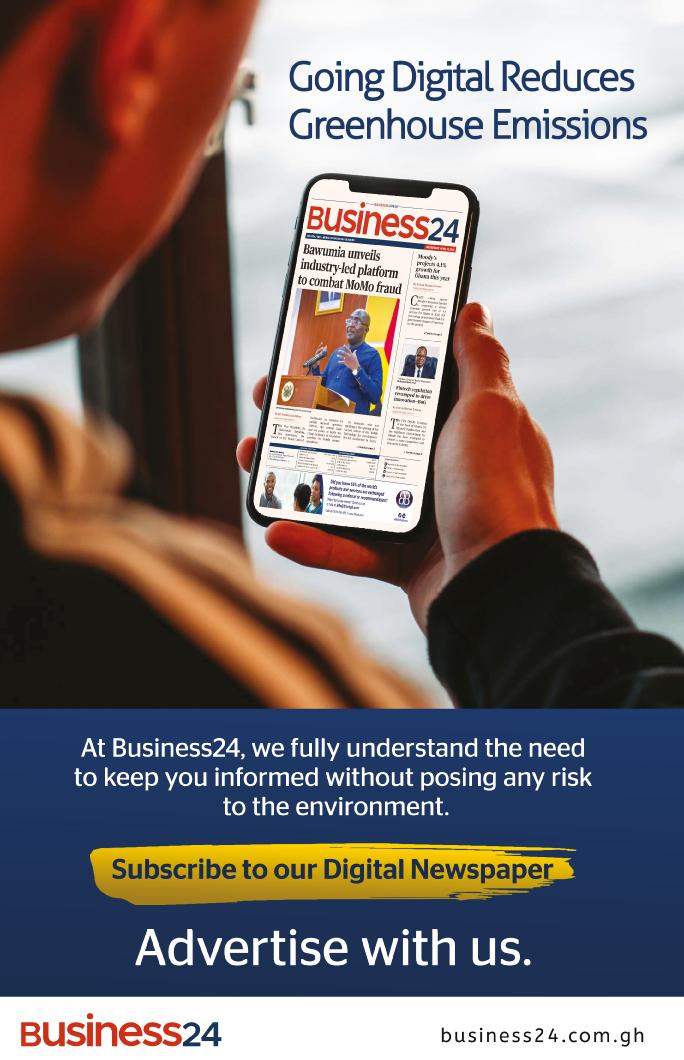




WEEKLY MARKET REVIEW FOR WEEK ENDING
May 19, 2023


May 19, 2023







May 19, 2023




Introduction
Ghana has a rich and diverse landscape, with varied topography, climate, and natural resources. To ensure sustainable development and protect the environment, the country has enacted a range of laws and regulations governing land use and planning.
In Ghana, land use and planning laws are primarily governed by the Land Use and Spatial Planning Act, 2016 (Act 925), which repealed and replaced the Town and Country Planning Act, 1960 (Act 64) under the auspices of the Land Use and Spatial Planning Authority (LUSPA), mandated to ensure the sustainable development of land and human settlements through a decentralized planning system amongst others. They are to ensure that, the District Assemblies in collaboration with the development institutions perform site and service programs for the purpose of development
This article will provide an overview
EDITOR: BENSON AFFUL editor@business24
of the laws that regulate land use and planning in Ghana, including land ownership, zoning regulations, building permits, and environmental impact regulations.
• Legal Framework Ghana has laws and regulations governing land use and planning, primarily the Land Use and Spatial Planning Act, 2016 (Act 925), Zoning and Land Use Regulations, 2019 (LI 2384), the National Building Regulations, 1996 and the Local Government Act, 2016. These laws cover issues such as land ownership, zoning regulations, building permits, and environmental impact assessments. These laws also aim to ensure that development activities in Ghana are conducted in a safe, sustainable, and environmentally friendly manner.
In summary, while ACT 925 provides a comprehensive legal
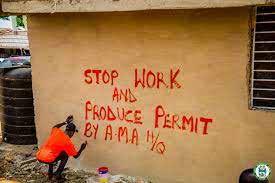
framework for regulating and managing land use and planning in Ghana, the Zoning and Land Use Regulations, 2019 (LI 2384) provides detailed guidelines for preparing and implementing zoning plans in Ghana.
• Land Ownership in Ghana
In Ghana, land ownership is regulated by the Land Act 2020 (ACT 1036), which recognizes two types of land: public land and private land. Public land is owned by the state and can be used for public purposes, such as schools, hospitals, and government buildings. Private land, on the other hand, is owned by individuals or organisations and can be used for residential, commercial, or industrial purposes.
Land ownership is a critical aspect of land use and planning in Ghana. The complex system of customary and statutory law governing land ownership in Ghana has signi cant implications for land use and plan-
PUBLISHED BY BUSINESS24 LTDning, as it determines who has the right to use and develop land in particular areas.
The Land Act recognizes several types of land ownership, including customary, public, and state land. This has implications for land use and planning, as di erent types of land ownership may be subject to di erent regulations and restrictions.
• Zoning
Physical planning units under Metropolitan/Municipal/District Assemblies (MMDAs) use zoning as a tool to specify the appropriate use and kind of development for and on a parcel of land. Zoning establishes the permitted and prohibited uses and developments on a piece of property within a zone, de ning the land's use category.
Stor y continues on page 4